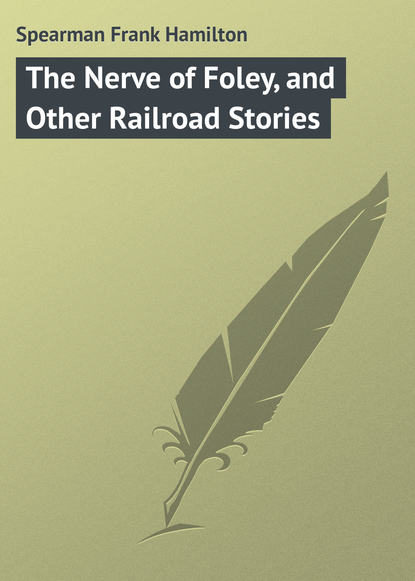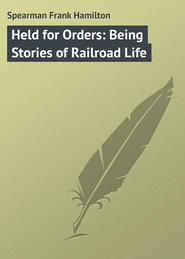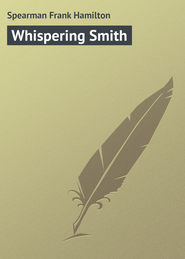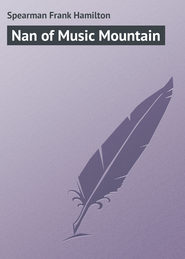По всем вопросам обращайтесь на: info@litportal.ru
(©) 2003-2024.
✖
The Nerve of Foley, and Other Railroad Stories
Настройки чтения
Размер шрифта
Высота строк
Поля
Cameron stood like one daft – and the boy catching sight of the baby that instant panted and stared in an idiotic state.
"Andy," said I, getting down and laying a hand on his shoulder, "if these fellows want to kill this man, let them do it alone – you'd better keep out. Only this minute he has saved your boy's life."
The sweat stood out on the big engineer's forehead like dew. I told the story. Cameron tried to speak; but he tried again and again before he could find his voice.
"Mate," he stammered, "you've been through a strike yourself – you know what it means, don't you? But if you've got a baby – " he gripped the boy tighter to his shoulder.
"I have, partner; three of 'em."
"Then you know what this means," said Andy, huskily, putting out his hand to Foley. He gripped the little man's fist hard, and, turning, walked away through the crowd.
Somehow it put a damper on the boys. Bat Nicholson was about the only man left who looked as if he wanted to eat somebody; and Foley, slinging his blouse over his shoulder, walked up to Bat and tapped him on the shoulder.
"Stranger," said he, gently, "could you oblige me with a chew of tobacco?"
Bat glared at him an instant; but Foley's nerve won.
Flushing a bit, Bat stuck his hand into his pocket; took it out; felt hurriedly in the other pocket, and, with some confusion, acknowledged he was short. Felix Kennedy intervened with a slab, and the three men fell at once to talking about the accident.
A long time afterwards some of the striking engineers were taken back, but none of those who had been guilty of actual violence. This barred Andy Cameron, who, though not worse than many others, had been less prudent; and while we all felt sorry for him after the other boys had gone to work, Lancaster repeatedly and positively refused to reinstate him.
Several times, though, I saw Foley and Cameron in confab, and one day up came Foley to the superintendent's office, leading little Andy, in his overalls, by the hand. They went into Lancaster's office together, and the door was shut a long time.
When they came out little Andy had a piece of paper in his hand.
"Hang on to it, son," cautioned Foley; "but you can show it to Mr. Reed if you want to."
The youngster handed me the paper. It was an order directing Andrew Cameron to report to the master-mechanic for service in the morning.
I happened over at the round-house one day nearly a year later, when Foley was showing Cameron a new engine, just in from the East. The two men were become great cronies; that day they fell to talking over the strike.
"There was never but one thing I really laid up against this man," said Cameron to me.
"What's that?" asked Foley.
"Why, the way you shoved that pistol into my face the first night you took out No. 1."
"I never shoved any pistol into your face." So saying, he stuck his hand into his pocket with the identical motion he used that night of the strike, and levelled at Andy, just as he had done then – a plug of tobacco. "That's all I ever pulled on you, son; I never carried a pistol in my life."
Cameron looked at him, then he turned to me, with a tired expression:
"I've seen a good many men, with a good many kinds of nerve, but I'll be splintered if I ever saw any one man with all kinds of nerve till I struck Foley."
Second Seventy-Seven
It is a bad grade yet. But before the new work was done on the river division, Beverly Hill was a terror to trainmen.
On rainy Sundays old switchmen in the Zanesville yards still tell in their shanties of the night the Blackwood bridge went out and Cameron's stock-train got away on the hill, with the Denver flyer caught at the foot like a rat in a trap.
Ben Buckley was only a big boy then, braking on freights; I was dispatching under Alex Campbell on the West End. Ben was a tall, loose-jointed fellow, but gentle as a kitten; legs as long as pinch-bars, yet none too long, running for the Beverly switch that night. His great chum in those days was Andy Cameron. Andy was the youngest engineer on the line. The first time I ever saw them together, Andy, short and chubby as a duck, was dancing around, half dressed, on the roof of the bath-house, trying to get away from Ben, who had the fire-hose below, playing on him with a two-inch stream of ice-water. They were up to some sort of a prank all the time.
June was usually a rush month with us. From the coast we caught the new crop Japan teas and the fall importations of China silks. California still sent her fruits, and Colorado was beginning cattle shipments. From Wyoming came sheep, and from Oregon steers; and all these not merely in car-loads, but in solid trains. At times we were swamped. The overland traffic alone was enough to keep us busy; on top of it came a great movement of grain from Nebraska that summer, and to crown our troubles a rate war sprang up. Every man, woman, and child east of the Mississippi appeared to have but one object in life – that was to get to California, and to go over our road. The passenger traffic burdened our resources to the last degree.
I was putting on new men every day then. We start them at braking on freights; usually they work for years at that before they get a train. But when a train-dispatcher is short on crews he must have them, and can only press the best material within reach. Ben Buckley had not been braking three months when I called him up one day and asked him if he wanted a train.
"Yes, sir, I'd like one first rate. But you know I haven't been braking very long, Mr. Reed," said he, frankly.
"How long have you been in the train service?"
I spoke brusquely, though I knew, without even looking at my service-card just how long it was.
"Three months, Mr. Reed."
It was right to a day.
"I'll probably have to send you out on 77 this afternoon." I saw him stiffen like a ramrod. "You know we're pretty short," I continued.
"Yes, sir."
"But do you know enough to keep your head on your shoulders and your train on your orders?"
Ben laughed a little. "I think I do. Will there be two sections to-day?"
"They're loading eighteen cars of stock at Ogalalla; if we get any hogs off the Beaver there will be two big sections. I shall mark you up for the first one, anyway, and send you out right behind the flyer. Get your badge and your punch from Carpenter – and whatever you do, Buckley, don't get rattled."
"No, sir; thank you, Mr. Reed."
But his "thank you" was so pleasant I couldn't altogether ignore it; I compromised with a cough. Perfect courtesy, even in the hands of the awkwardest boy that ever wore his trousers short, is a surprisingly handy thing to disarm gruff people with. Ben was undeniably awkward; his legs were too long, and his trousers decidedly out of touch with his feet; but I turned away with the conviction that in spite of his gawkiness there was something to the boy. That night proved it.
When the flyer pulled in from the West in the afternoon it carried two extra sleepers. In all, eight Pullmans, and every one of them loaded to the ventilators. While the train was changing engines and crews, the excursionists swarmed out of the hot cars to walk up and down the platform. They were from New York, and had a band with them – as jolly a crowd as we ever hauled – and I noticed many boys and girls sprinkled among the grown folks.
As the heavy train pulled slowly out the band played, the women waved handkerchiefs, and the boys shouted themselves hoarse – it was like a holiday, everybody seemed so happy. All I hoped, as I saw the smoke of the engine turn to dust on the horizon, was that I could get them over my division and their lives safely off my hands. For a week we had had heavy rains, and the bridges and track gave us worry.
Half an hour after the flyer left, 77, the fast stock-freight, wound like a great snake around the bluff, after it. Ben Buckley, tall and straight as a pine, stood on the caboose. It was his first train, and he looked as if he felt it.
In the evening I got reports of heavy rains east of us, and after 77 reported "out" of Turner Junction and pulled over the divide towards Beverly, it was storming hard all along the line. By the time they reached the hill Ben had his men out setting brakes – tough work on that kind of a night; but when the big engine struck the bluff the heavy train was well in hand, and it rolled down the long grade as gently as a curtain.
Ben was none too careful, for half-way down the hill they exploded torpedoes. Through the driving storm the tail-lights of the flyer were presently seen. As they pulled carefully ahead, Ben made his way through the mud and rain to the head end and found the passenger-train stalled. Just before them was Blackwood Creek, bank full, and the bridge swinging over the swollen stream like a grape-vine.
At the foot of Beverly Hill there is a siding – a long siding, once used as a sort of cut-off to the upper Zanesville yards. This side track parallels the main track for half a mile, and on this siding Ben, as soon as he saw the situation, drew in with his train so that it lay beside the passenger-train and left the main line clear behind. It then became his duty to guard the track to the rear, where the second section of the stock-train would soon be due.
It was pouring rain and as dark as a pocket. He started his hind-end brakeman back on the run with red lights and torpedoes to warn the second section well up the hill. Then walking across from his caboose, he got under the lee of the hind Pullman sleeper to watch for the expected headlight.
The storm increased in violence. It was not the rain driving in torrents, not the lightning blazing, nor the deafening crashes of thunder, that worried him, but the wind – it blew a gale. In the blare of the lightning he could see the oaks which crowned the bluffs whip like willows in the storm. It swept quartering down the Beverly cut as if it would tear the ties from under the steel. Suddenly he saw, far up in the black sky, a star blazing; it was the headlight of Second Seventy-Seven.
A whistle cut the wind; then another. It was the signal for brakes; the second section was coming down the steep grade. He wondered how far back his man had got with the bombs. Even as he wondered he saw a yellow flash below the headlight; it was the first torpedo. The second section was already well down the top of the hill. Could they hold it to the bottom?
Like an answer came shorter and sharper the whistle for brakes. Ben thought he knew who was on that engine; thought he knew that whistle – for engineers whistle as differently as they talk. He still hoped and believed – knowing who was on the engine – that the brakes would hold the heavy load; but he feared – A man running up in the rain passed him. Ben shouted and held up his lantern; it was his head brakeman.










